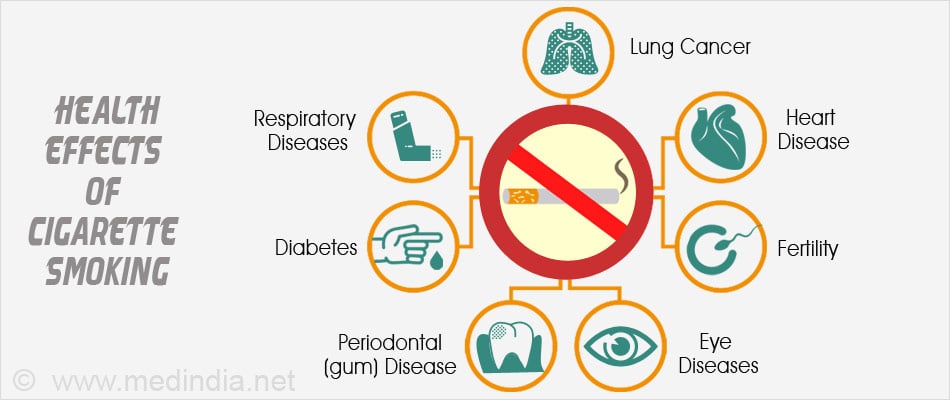Smoking - Health Risks
Smoking merely one cigarette can reduce the blood supply to one’s skin for over an hour, raise blood pressure, cause a heart attack, or a stroke. Couples who smoke are more likely to have problems with fertility.
- Cigarette smoking worsens asthma when an asthmatic patient indulges in active or passive smoking.
- Blood vessels in the eye are very sensitive and often get damaged by smoke, causing itchiness.
- Heavy smokers are more likely to suffer macular degeneration and loss of eyesight in the later stages.
- Smoking increases the risk of periodontal disease, causing swollen gums, bad breath and falling of teeth.

- Smoking often contributes to the development of mouth ulcers or peptic ulcers. Smoking also affects a person’s physical appearance as it reduces blood circulation in the skin leading to early triggering of the aging process. Smoking may often damage blood vessels and may cause the narrowing of arteries that lead to the penis, reducing flow of blood. As a result, smokers may often experience impotence or erection problems, resulting in a negative affect on their sexual performance.
- Babies born to mothers who smoke during pregnancy are twice as likely to be born prematurely, and with a low birth weight. Smoking during pregnancy increases the risk of spontaneous abortion and perinatal mortality referred to as the fetal tobacco syndrome.
- No matter how healthy the routine you follow, if you continue to smoke, a healthy diet and exercise regimen would not have the desired good affect.
- Smoking augments cardiovascular diseases--poor circulation, angina (chest pains), heart attack, and stroke.
- Smoking reduces life expectancy by seven to eight years.
- Smoking accelerates the hardening of arteries resulting in blood clots and risk of stroke.
- Smoking is the most common cause of Chronic Obstructive Airway Disease (COPD). Smokers are predisposed to emphysema, which results in contracting bronchitis again and again. This further predisposes them to the risk of lung and heart failure.
- Lung damage from COPD is permanent, but giving up smoking at any stage reduces the rate of lung deterioration. As smoking continues, lung function declines, and breathlessness ensues. As the condition progresses, severe breathing problems can lead to hospitalization. The final stage is death resulting from slow and progressive breathlessness.
- Smoking causes fat deposits resulting in the blockage of blood vessels, which lead to a heart attack. Blood vessels that lead to the brain are blocked due to the fatty disposition in smokers’ blood vessels. This can lead to collapse, stroke, and paralysis. If the arteries leading to the kidneys are affected, one may suffer high blood pressure or kidney failure. Blockage of vascular supply to the legs may lead to gangrene and amputation.
- The risk of lung cancer increases with the duration of smoking. The risk of contracting mouth cancer is four times higher for a smoker, than for a non-smoker. Cancer can start in many areas of mouth. Other types of cancer that are more common in smokers are: bladder cancer, cancer of the esophagus, cancer of the kidneys, cancer of the pancreas, and cervical cancer.
- Smoking indirectly causes lung tuberculosis. Prevalence of TB is about 3 times as great among the regularly smoking population, as compared to non-smokers.













